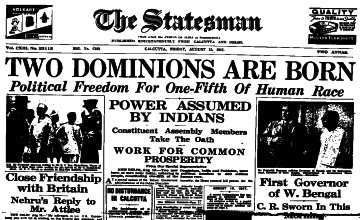

British Government's Policy towards Indian States as visible in Attllee's statement and cabinet mission memorandum declared through Act of 1947.
British Parliament passed the India Independence Act on 18 July 1947. Under this Act, the day of independence was fixed. Bharat was created as a self-governing dominion and as a successor State of British India. What happened was that British India obtained independence. So far as States are concerned, once this Act was applied, paramountcy of British Crown over the States lapsed and States became free from all their obligations to the Crown. As a consequence, States became separate entity.
British Prime Minister Attlee's Statement dated 3 June 1947 clearly mentions the policy of British Government towards the Princely States : “His Majesty's Government wish to make it clear that the decisions announced….relate only to British India and that their policy towards Indian States contained in the Cabinet Mission Memorandum of 12th May, I946, remains unchanged.” The Cabinet Mission, in its Memorandum dated 12 May 1946 stated “the rights of the States which flow from their relationship to the Crown will no longer exist and that all the rights surrendered by the States to the paramount power will return to the States". Paragraph 5 of the Memorandum goes on to say: "Political arrangements between the States on the one side and the British India on the other will thus be brought to an end. The void will have to be filled either by the States entering into a federal relationship with the successor Government or Governments in British India, or failing this, entering into particular political arrangements with it or them."
The same position was reiterated by Lord Mountbatten while addressing the Full Meeting of Chamber of Princes dated 25 July 1947. Mountbatten said in his statement: "Let us turn for one moment to the Cabinet Mission Plan of 12 May 1946. In this plan the proposal was that the States should surrender to the Central Government three subjects- Defence, External Affairs and Communications. That was a plan which, to the best of my belief, every ruler and every State accepted as reasonable, fair and just." But the key phrase in his statement is this: "You cannot run away from the Dominion Government which is your neighbor, any more than you cannot run away from the subjects for whose welfare you are responsible. Whatever may be your decision, I hope you feel that I have at least done my duty to the Subjects." Lord Mountbatten did not at that time- nor did the British Parliament at any time in regard to the States- ever refer to communal representation, by which, in Bharat, is meant the grouping of Hindus and Moslems. There was no such reference, and it was not the idea of that time that the States should be referred to in that way in any of these documents.
The above said policy of British Government was concretized by Section 7 of the Indian Independence Act of 1947, which says: "His Majesty's Government in the United Kingdom have no responsibility as respects the government of any of the territories which, immediately before that day, were included in British India;”.... "The suzerainty of His Majesty over the Indian States lapses, and with it, all treaties and agreements in force at the date of the passing of this Act between his Majesty and the rulers of Indian States, all functions exercisable by His Majesty at that date with respect to Indian States, all obligations of His Majesty existing at that date towards Indian States or the rulers thereof, and all powers, rights, authority or jurisdiction exercisable by His Majesty at that date in or in relation to Indian States by treaty, grant, usage, sufferance or otherwise.
Now because of lapse of paramountcy, there was a vacuum. So the Government of India Act, 1935 ( amended in 1947), which became our Interim Constitution. Section 6 dealing with accession of Indian States provided that if any State executes the Instrument of Accession to a Dominion and Governor General signifies his acceptance of the same, the State will become part of that Dominion. Almost all the Indian States signed the Instrument of Accession and became part of Bharat. Jammu and Kashmir is also one of the States which signed such Instrument of Accession with Bharat.